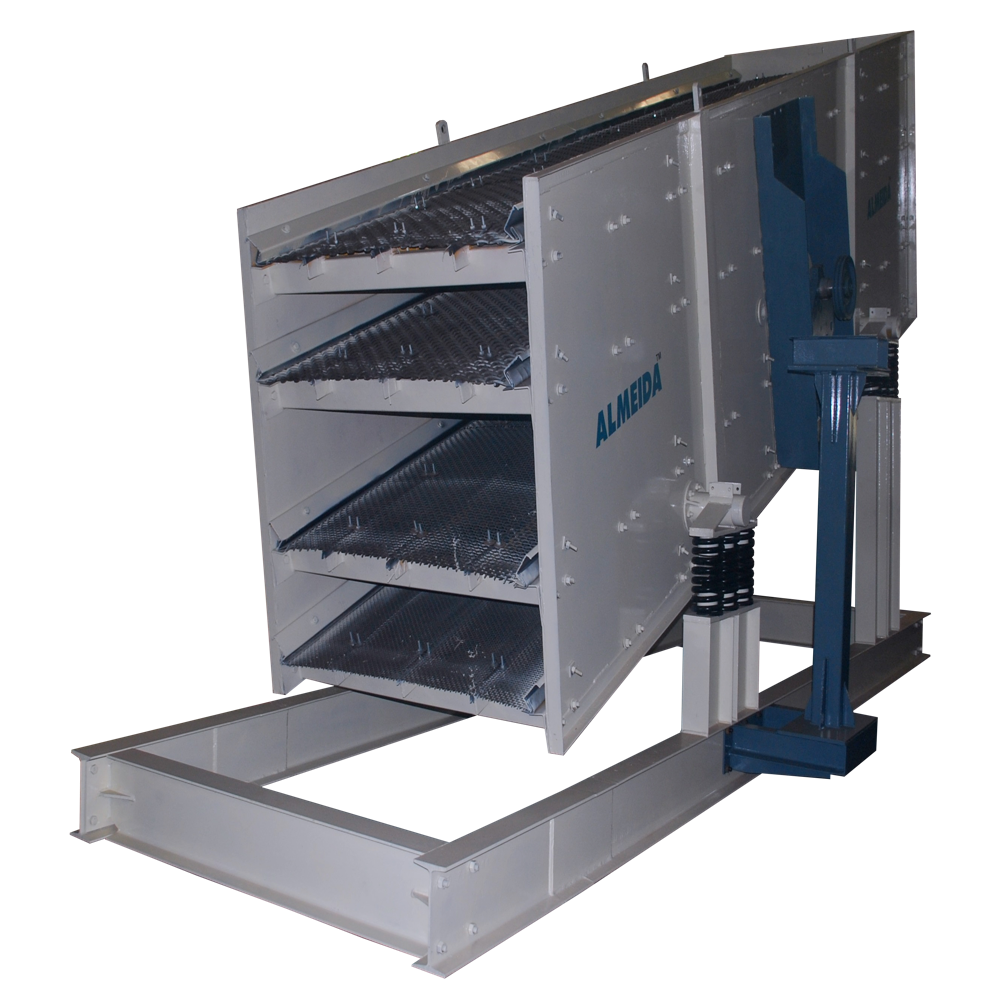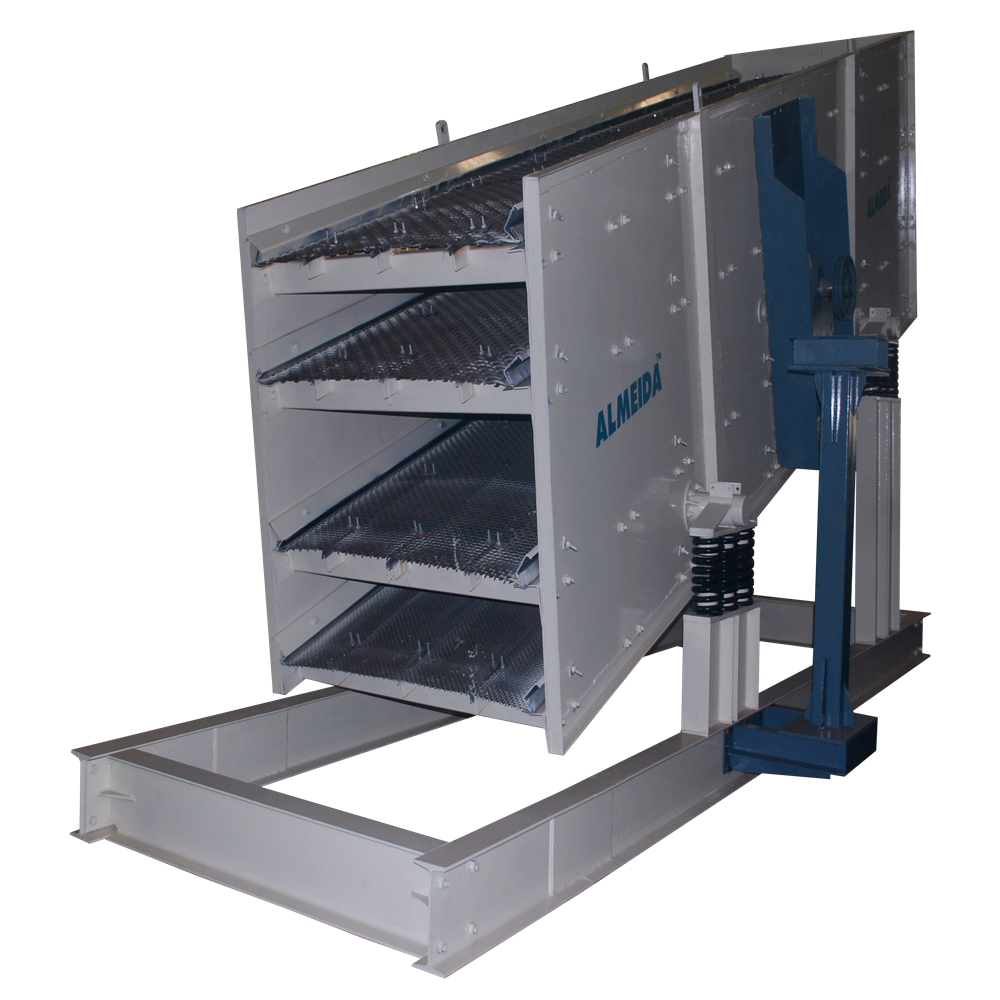Call Us08045800995

Vibratory Screen
Product Details:
- Material Metal Alloy
- Processing Type Standard
- Condition New
- Product Type Vibratory Screen
- Color Yellow
- Power Mode Electric
- Application Industrial
- Click to view more
X
Vibratory Screen Price And Quantity
- 1 Unit
Vibratory Screen Product Specifications
- Yellow
- Standard
- Metal Alloy
- New
- Vibratory Screen
- Electric
- Industrial
Vibratory Screen Trade Information
- 15 Unit Per Month
- 7-15 Days
Product Description
We are known for providing finest quality vibratory screen. It is engineered for separating granulated materials. In addition to this, the said material is also capable of transporting parts from one place to another. Our offered product is found in agriculture, food, mining, pharmaceutical and chemical industries. This offering is highly efficient in removing oversized materials from small materials. Industrial vibration screen can also eliminate excess liquid from final products. It is most commonly used while the screening procedure for the separation of materials. The offered product has maximum versatility, strong structure, seamless finishing and durability. It possesses easy operations and smooth functioning.
Applications of Vibratory Screen:
1. Mineral Processing: Vibratory screens are commonly used in the mining and mineral processing industry to separate particles based on their size and shape. They help in grading and classifying minerals according to their specific properties, such as density, size, and particle shape.
2. Aggregate Production: In the construction industry, industrial vibration screens are used to separate and classify aggregates based on their size, which is essential for producing high-quality concrete and asphalt.
3. Recycling: Vibratory screens play a vital role in recycling processes. They help in separating and classifying recyclable materials like paper, plastic, glass, and metal, allowing for more efficient recycling operations.
4. Food Processing: In the food industry, vibratory screens are used to separate and classify food products based on size, shape, and texture. They are commonly used in cereal processing, flour mills, and other food production facilities.
5. Pharmaceutical Industry: Vibratory screens are used in pharmaceutical manufacturing to separate and classify pharmaceutical powders and granules, ensuring the quality and uniformity of the final products.
6. Chemical Processing: In the chemical industry, vibratory screens are utilized to separate and classify various chemical compounds and products, ensuring consistent particle size and purity.
7. Pulp and Paper Industry: Vibratory screens help in removing impurities and separating fibers in the pulp and paper manufacturing process, leading to improved paper quality.
8. Ceramic Industry: In ceramic manufacturing, these equipments are used to separate and grade ceramic materials based on their particle size and shape, ensuring uniformity in the final products.
9. Foundry Operations: Vibratory screens are used in foundries to separate and classify sand and metal particles during the casting process, facilitating the recycling of sand and reducing waste.
10. Agriculture: Vibratory screens are employed in the agricultural sector for various applications, such as seed cleaning and grading, separating grain from chaff, and sorting produce.
11. Water Treatment: In water treatment plants, industrial vibration screens are used to remove solid particles from water, helping to purify the water for various uses.
FAQ:
Q. What is a vibratory screen?
Ans: A vibratory screen, also known as a vibrating screen or sieve, is a mechanical device used to separate, classify, and dewater particles based on their size, shape, and composition. It consists of a screen mesh or surface that vibrates in a circular, elliptical, or linear motion.
Q. How does a vibratory screen work?
Ans: These machines work by applying vibration to the screen surface, causing the particles to move and separate based on their size and shape. The vibration is typically generated by an electric motor with eccentric weights, which creates a horizontal or vertical motion.
Q. What are the types of vibratory screens?
Ans: There are various types of vibratory screens, including circular vibrating screens, linear vibrating screens, elliptical vibrating screens, and high-frequency vibrating screens. Each type is designed for specific applications and particle separation requirements.
Q. What are the main applications of vibratory screens?
Ans: Vibratory screens are widely used in industries such as mining, mineral processing, construction, recycling, food processing, pharmaceuticals, chemicals, ceramics, and agriculture, among others, for particle separation, grading, and classification purposes.
Q. How is the screen mesh size determined?
Ans: The screen mesh size is determined based on the desired particle size separation. Finer mesh sizes allow smaller particles to pass through, while larger mesh sizes allow only larger particles to pass. The choice of mesh size depends on the application and the specific requirements of the process.
Q. How is screen efficiency measured?
Ans: Screen efficiency is typically measured by the ratio of the amount of undersized material (fine particles) that passes through the screen to the total amount of input material. It is expressed as a percentage and indicates how well the screen is performing in separating the desired particles.
Q. How do you maintain a vibratory screen?
Ans: Proper maintenance of a vibratory screen includes regular inspection, cleaning, and lubrication of components. Additionally, checking for screen wear, tensioning the screen mesh if necessary, and addressing any abnormal vibrations or noises are essential to ensure optimal performance and longevity.
Q. Can vibratory screens handle wet materials?
Ans: Yes, many vibratory screens are designed to handle wet materials. They often incorporate features like spray bars or water sprays to assist in the screening of moist or sticky materials. Dewatering screens are specifically designed to remove water from wet materials efficiently.
Q. How can I optimize the performance of my vibratory screen?
Ans: To optimize the performance of a vibratory screen, you can adjust the amplitude and frequency of vibration, ensure proper screen tensioning, and select the appropriate screen mesh size for your application. Regular maintenance and inspections are also crucial to maintaining peak performance.
Q. Can vibratory screens be customized for specific applications?
Ans: Yes, manufacturers often offer vibratory screens that can be customized to meet specific application requirements. Customizations may include screen size, screen mesh material, construction materials, and additional features like dust covers, anti-blinding devices, and discharge outlets.
Engineered for Industrial Excellence
Our vibratory screen is tailored to address the separation and sorting needs found in diverse industrial settings. The metal alloy construction delivers exceptional resilience, while the electric power mode guarantees operational consistency. With our standard processing design, we ensure seamless integration into your existing workflow, providing a reliable solution for efficient material handling.
Ready for Global Supply from India
As a trusted manufacturer, exporter, and supplier, we extend our reach from India to international markets. Rigorous quality control and industry-leading standards mean that each vibratory screen meets exacting specifications. Our commitment assures clients of prompt supply, technical support, and custom solutions for industrial screening.
FAQs of Vibratory Screen:
Q: How does the electric-powered vibratory screen function in industrial applications?
A: The electric-powered vibratory screen operates by generating controlled vibrations that facilitate the separation and sorting of various materials. Its efficient design ensures consistent performance, making it suitable for continuous industrial use where reliability and precision are critical.Q: What materials are used in the construction of this vibratory screen?
A: This vibratory screen is constructed from high-quality metal alloy, providing superior strength and longevity. The choice of metal alloy ensures the equipment withstands heavy-duty industrial operations and maintains performance over extended periods.Q: When should an industrial facility consider using a vibratory screen?
A: A vibratory screen should be considered when there is a need for efficient grading, sorting, or separation of materials in bulk processing industries. Common applications include mining, construction, chemical, and food processing sectors where uniform particle size is essential.Q: Where can this vibratory screen be installed within an industrial setting?
A: The screen can be integrated into various points within industrial workflows, such as before or after crushing systems, in material preparation areas, or at points of final processing to optimize material flow and quality.Q: What is the typical process for installing and setting up the vibratory screen?
A: Installation involves anchoring the equipment securely at the desired location, connecting to a compatible electrical supply, and calibrating vibration settings to match the specific material requirements. Our support team provides guidance throughout setup to maximize efficiency.Q: How should this vibratory screen be used for optimal results?
A: For best results, operate the screen according to the recommended materials and capacities. Periodic maintenance, such as checking for wire mesh integrity and tightening bolts, ensures sustained performance and prevents operational issues.Q: What are the key benefits of choosing this new vibratory screen model?
A: Key benefits include robust construction, reliable electric operation, efficient material processing, and enhanced productivity. The screens metal alloy build ensures durability, while its design allows for easy maintenance and seamless operation in various industrial settings.Tell us about your requirement

Price:
Quantity
Select Unit
- 50
- 100
- 200
- 250
- 500
- 1000+
Additional detail
Mobile number
Email

 English
English Spanish
Spanish French
French German
German Italian
Italian Chinese (Simplified)
Chinese (Simplified) Japanese
Japanese Korean
Korean Arabic
Arabic Portuguese
Portuguese



